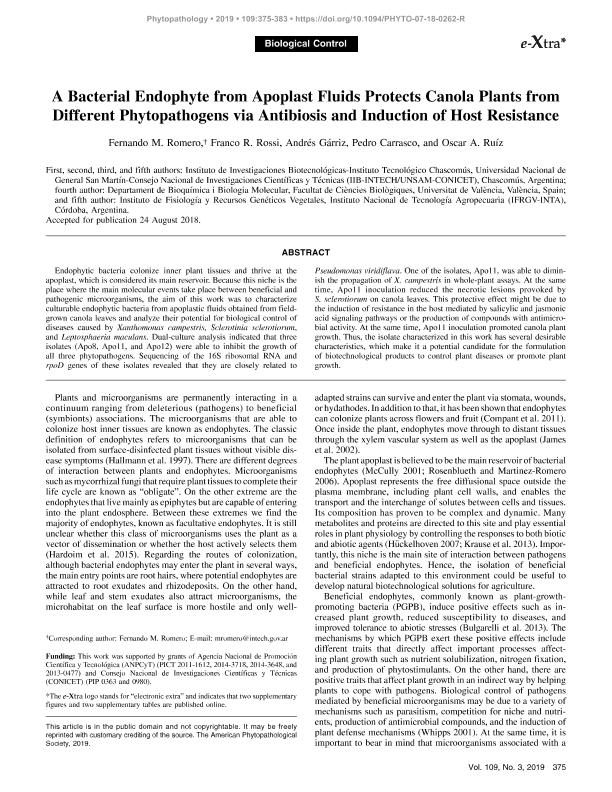Mostrar el registro sencillo del ítem
dc.contributor.author
Romero, Fernando Matias

dc.contributor.author
Rossi, Franco Rubén

dc.contributor.author
Gárriz, Andrés

dc.contributor.author
Carrasco, Pedro
dc.contributor.author
Ruiz, Oscar Adolfo

dc.date.available
2020-11-13T17:28:19Z
dc.date.issued
2019-03
dc.identifier.citation
Romero, Fernando Matias; Rossi, Franco Rubén; Gárriz, Andrés; Carrasco, Pedro; Ruiz, Oscar Adolfo; A bacterial endophyte from apoplast fluids protects canola plants from different phytopathogens via antibiosis and induction of host resistance; American Phytopathological Society; Phytopathology; 109; 3; 3-2019; 375-383
dc.identifier.issn
0031-949X
dc.identifier.uri
http://hdl.handle.net/11336/118342
dc.description.abstract
Endophytic bacteria colonize inner plant tissues and thrive at the apoplast, which is considered its main reservoir. Because this niche is the place where the main molecular events take place between beneficial and pathogenic microorganisms, the aim of this work was to characterize culturable endophytic bacteria from apoplastic fluids obtained from field-grown canola leaves and analyze their potential for biological control of diseases caused by Xanthomonas campestris, Sclerotinia sclerotiorum, and Leptosphaeria maculans. Dual-culture analysis indicated that three isolates (Apo8, Apo11, and Apo12) were able to inhibit the growth of all three phytopathogens. Sequencing of the 16S ribosomal RNA and rpoD genes of these isolates revealed that they are closely related to Pseudomonas viridiflava. One of the isolates, Apo11, was able to diminish the propagation of X. campestris in whole-plant assays. At the same time, Apo11 inoculation reduced the necrotic lesions provoked by S. sclerotiorum on canola leaves. This protective effect might be due to the induction of resistance in the host mediated by salicylic and jasmonic acid signaling pathways or the production of compounds with antimicrobial activity. At the same time, Apo11 inoculation promoted canola plant growth. Thus, the isolate characterized in this work has several desirable characteristics, which make it a potential candidate for the formulation of biotechnological products to control plant diseases or promote plant growth.
dc.format
application/pdf
dc.language.iso
eng
dc.publisher
American Phytopathological Society

dc.rights
info:eu-repo/semantics/openAccess
dc.rights.uri
https://creativecommons.org/licenses/by-nc-sa/2.5/ar/
dc.subject
ENDOPHYTES
dc.subject
CANOLA
dc.subject
APOPLAST
dc.subject
BIOLOGICAL CONTROL
dc.subject.classification
Biología Celular, Microbiología

dc.subject.classification
Ciencias Biológicas

dc.subject.classification
CIENCIAS NATURALES Y EXACTAS

dc.title
A bacterial endophyte from apoplast fluids protects canola plants from different phytopathogens via antibiosis and induction of host resistance
dc.type
info:eu-repo/semantics/article
dc.type
info:ar-repo/semantics/artículo
dc.type
info:eu-repo/semantics/publishedVersion
dc.date.updated
2020-11-05T18:32:58Z
dc.identifier.eissn
1943-7684
dc.journal.volume
109
dc.journal.number
3
dc.journal.pagination
375-383
dc.journal.pais
Estados Unidos

dc.journal.ciudad
New York
dc.description.fil
Fil: Romero, Fernando Matias. Consejo Nacional de Investigaciones Científicas y Técnicas. Centro Científico Tecnológico Conicet - La Plata. Instituto de Investigaciones Biotecnológicas. Instituto de Investigaciones Biotecnológicas "Dr. Raúl Alfonsín" (sede Chascomús). Universidad Nacional de San Martín. Instituto de Investigaciones Biotecnológicas. Instituto de Investigaciones Biotecnológicas "Dr. Raúl Alfonsín" (sede Chascomús); Argentina
dc.description.fil
Fil: Rossi, Franco Rubén. Consejo Nacional de Investigaciones Científicas y Técnicas. Centro Científico Tecnológico Conicet - La Plata. Instituto de Investigaciones Biotecnológicas. Instituto de Investigaciones Biotecnológicas "Dr. Raúl Alfonsín" (sede Chascomús). Universidad Nacional de San Martín. Instituto de Investigaciones Biotecnológicas. Instituto de Investigaciones Biotecnológicas "Dr. Raúl Alfonsín" (sede Chascomús); Argentina
dc.description.fil
Fil: Gárriz, Andrés. Consejo Nacional de Investigaciones Científicas y Técnicas. Centro Científico Tecnológico Conicet - La Plata. Instituto de Investigaciones Biotecnológicas. Instituto de Investigaciones Biotecnológicas "Dr. Raúl Alfonsín" (sede Chascomús). Universidad Nacional de San Martín. Instituto de Investigaciones Biotecnológicas. Instituto de Investigaciones Biotecnológicas "Dr. Raúl Alfonsín" (sede Chascomús); Argentina
dc.description.fil
Fil: Carrasco, Pedro. Universidad de Valencia; España. Instituto Nacional de Tecnología Agropecuaria. Centro de Investigaciones Agropecuarias. Instituto de Fisiología y Recursos Genéticos Vegetales; Argentina
dc.description.fil
Fil: Ruiz, Oscar Adolfo. Consejo Nacional de Investigaciones Científicas y Técnicas. Centro Científico Tecnológico Conicet - La Plata. Instituto de Investigaciones Biotecnológicas. Instituto de Investigaciones Biotecnológicas "Dr. Raúl Alfonsín" (sede Chascomús). Universidad Nacional de San Martín. Instituto de Investigaciones Biotecnológicas. Instituto de Investigaciones Biotecnológicas "Dr. Raúl Alfonsín" (sede Chascomús); Argentina
dc.journal.title
Phytopathology

dc.relation.alternativeid
info:eu-repo/semantics/altIdentifier/url/https://apsjournals.apsnet.org/doi/10.1094/PHYTO-07-18-0262-R
dc.relation.alternativeid
info:eu-repo/semantics/altIdentifier/doi/https://doi.org/10.1094/PHYTO-07-18-0262-R
Archivos asociados
